A Template for Term 2 ass_3 Lessons Learned
VerifiedAdded on 2022/05/26
|7
|1865
|415
AI Summary
This article defines the best suited project management methods and prcatices those can improve all difficult situations that may negatively impact the progress of the project. I think for accomplishing the project objectives and aim the project managers and project team members should incorporate different ideas and strategies collectively. The lessons those have been learned regarding data collection and application, what actually happened or situation analysis and different improvement strategies for improving the situation are documented in this lesson learned report.
Contribute Materials
Your contribution can guide someone’s learning journey. Share your
documents today.
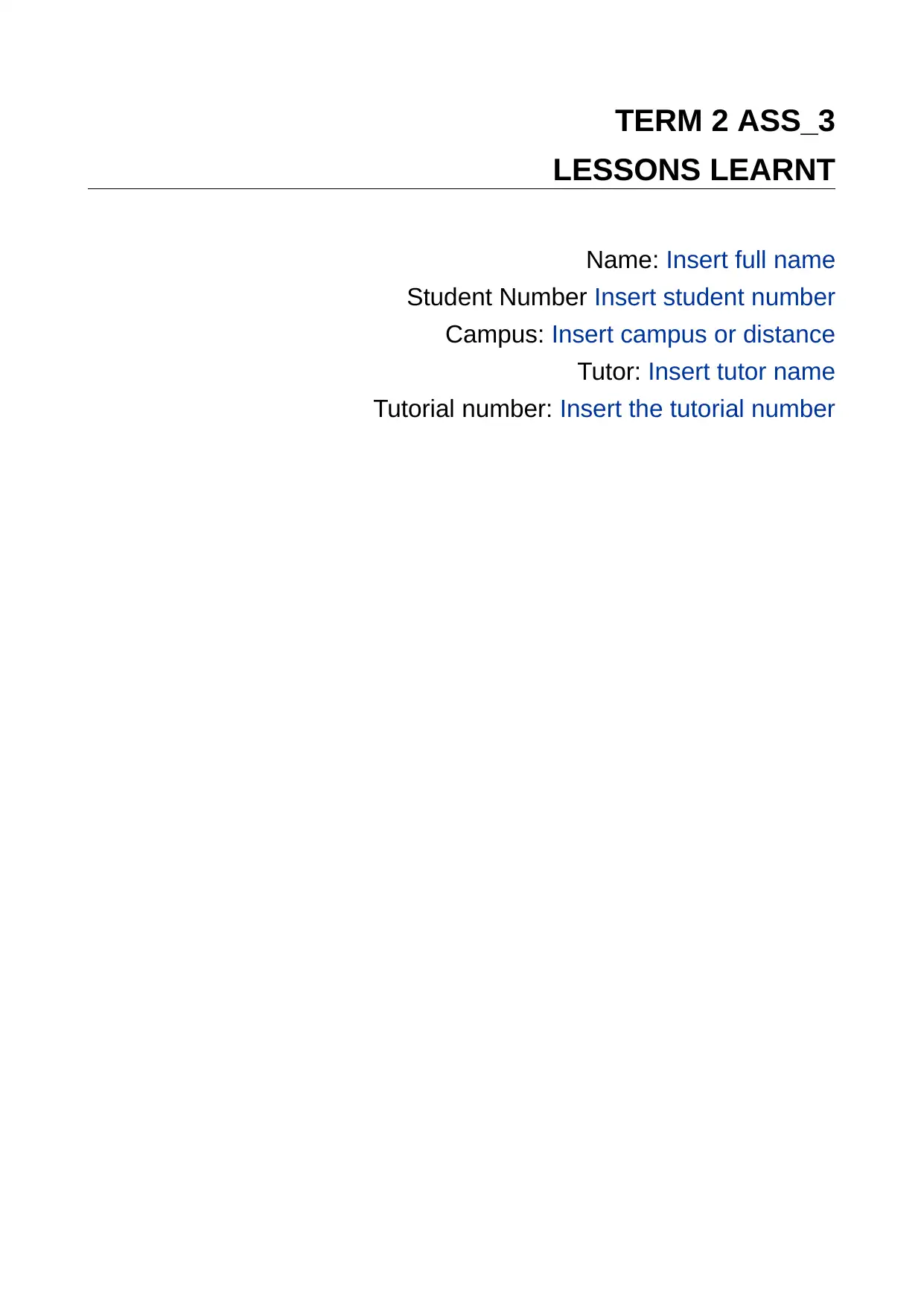
TERM 2 ASS_3
LESSONS LEARNT
Name: Insert full name
Student Number Insert student number
Campus: Insert campus or distance
Tutor: Insert tutor name
Tutorial number: Insert the tutorial number
LESSONS LEARNT
Name: Insert full name
Student Number Insert student number
Campus: Insert campus or distance
Tutor: Insert tutor name
Tutorial number: Insert the tutorial number
Secure Best Marks with AI Grader
Need help grading? Try our AI Grader for instant feedback on your assignments.

Notes to the Author
[This document is a template. It has been tailored to suit the assessment. All fields within the template should
be completed as per the project scenario provided.
Blue italicized text provides an explanation of what should be included for each section. Remove all
blue text prior to submission. If there are two or more options for you to decide between, revert
the option you are keeping to black and remove the other.
[This document is a template. It has been tailored to suit the assessment. All fields within the template should
be completed as per the project scenario provided.
Blue italicized text provides an explanation of what should be included for each section. Remove all
blue text prior to submission. If there are two or more options for you to decide between, revert
the option you are keeping to black and remove the other.
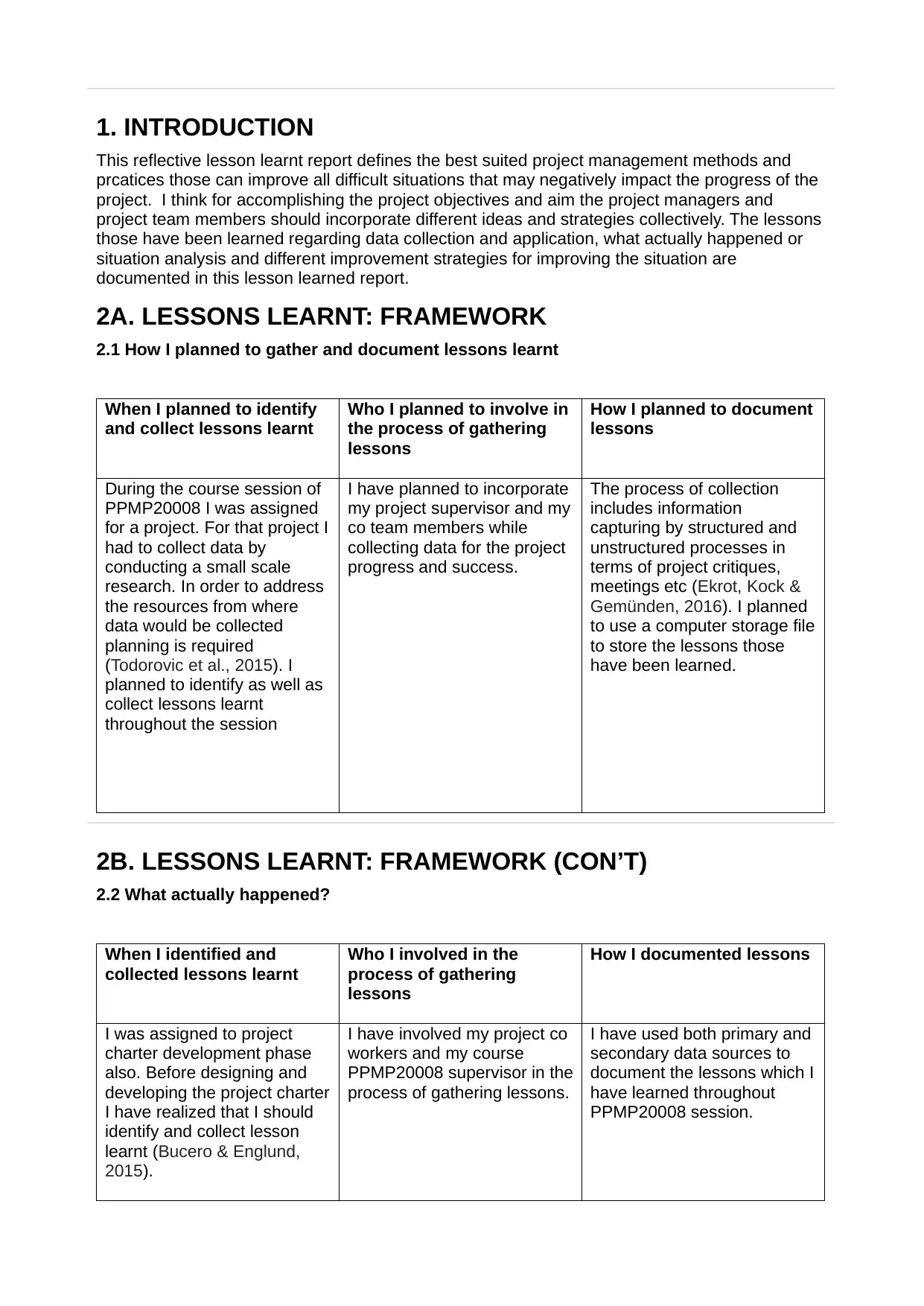
1. INTRODUCTION
This reflective lesson learnt report defines the best suited project management methods and
prcatices those can improve all difficult situations that may negatively impact the progress of the
project. I think for accomplishing the project objectives and aim the project managers and
project team members should incorporate different ideas and strategies collectively. The lessons
those have been learned regarding data collection and application, what actually happened or
situation analysis and different improvement strategies for improving the situation are
documented in this lesson learned report.
2A. LESSONS LEARNT: FRAMEWORK
2.1 How I planned to gather and document lessons learnt
When I planned to identify
and collect lessons learnt
Who I planned to involve in
the process of gathering
lessons
How I planned to document
lessons
During the course session of
PPMP20008 I was assigned
for a project. For that project I
had to collect data by
conducting a small scale
research. In order to address
the resources from where
data would be collected
planning is required
(Todorovic et al., 2015). I
planned to identify as well as
collect lessons learnt
throughout the session
I have planned to incorporate
my project supervisor and my
co team members while
collecting data for the project
progress and success.
The process of collection
includes information
capturing by structured and
unstructured processes in
terms of project critiques,
meetings etc (Ekrot, Kock &
Gemünden, 2016). I planned
to use a computer storage file
to store the lessons those
have been learned.
2B. LESSONS LEARNT: FRAMEWORK (CON’T)
2.2 What actually happened?
When I identified and
collected lessons learnt
Who I involved in the
process of gathering
lessons
How I documented lessons
I was assigned to project
charter development phase
also. Before designing and
developing the project charter
I have realized that I should
identify and collect lesson
learnt (Bucero & Englund,
2015).
I have involved my project co
workers and my course
PPMP20008 supervisor in the
process of gathering lessons.
I have used both primary and
secondary data sources to
document the lessons which I
have learned throughout
PPMP20008 session.
This reflective lesson learnt report defines the best suited project management methods and
prcatices those can improve all difficult situations that may negatively impact the progress of the
project. I think for accomplishing the project objectives and aim the project managers and
project team members should incorporate different ideas and strategies collectively. The lessons
those have been learned regarding data collection and application, what actually happened or
situation analysis and different improvement strategies for improving the situation are
documented in this lesson learned report.
2A. LESSONS LEARNT: FRAMEWORK
2.1 How I planned to gather and document lessons learnt
When I planned to identify
and collect lessons learnt
Who I planned to involve in
the process of gathering
lessons
How I planned to document
lessons
During the course session of
PPMP20008 I was assigned
for a project. For that project I
had to collect data by
conducting a small scale
research. In order to address
the resources from where
data would be collected
planning is required
(Todorovic et al., 2015). I
planned to identify as well as
collect lessons learnt
throughout the session
I have planned to incorporate
my project supervisor and my
co team members while
collecting data for the project
progress and success.
The process of collection
includes information
capturing by structured and
unstructured processes in
terms of project critiques,
meetings etc (Ekrot, Kock &
Gemünden, 2016). I planned
to use a computer storage file
to store the lessons those
have been learned.
2B. LESSONS LEARNT: FRAMEWORK (CON’T)
2.2 What actually happened?
When I identified and
collected lessons learnt
Who I involved in the
process of gathering
lessons
How I documented lessons
I was assigned to project
charter development phase
also. Before designing and
developing the project charter
I have realized that I should
identify and collect lesson
learnt (Bucero & Englund,
2015).
I have involved my project co
workers and my course
PPMP20008 supervisor in the
process of gathering lessons.
I have used both primary and
secondary data sources to
document the lessons which I
have learned throughout
PPMP20008 session.
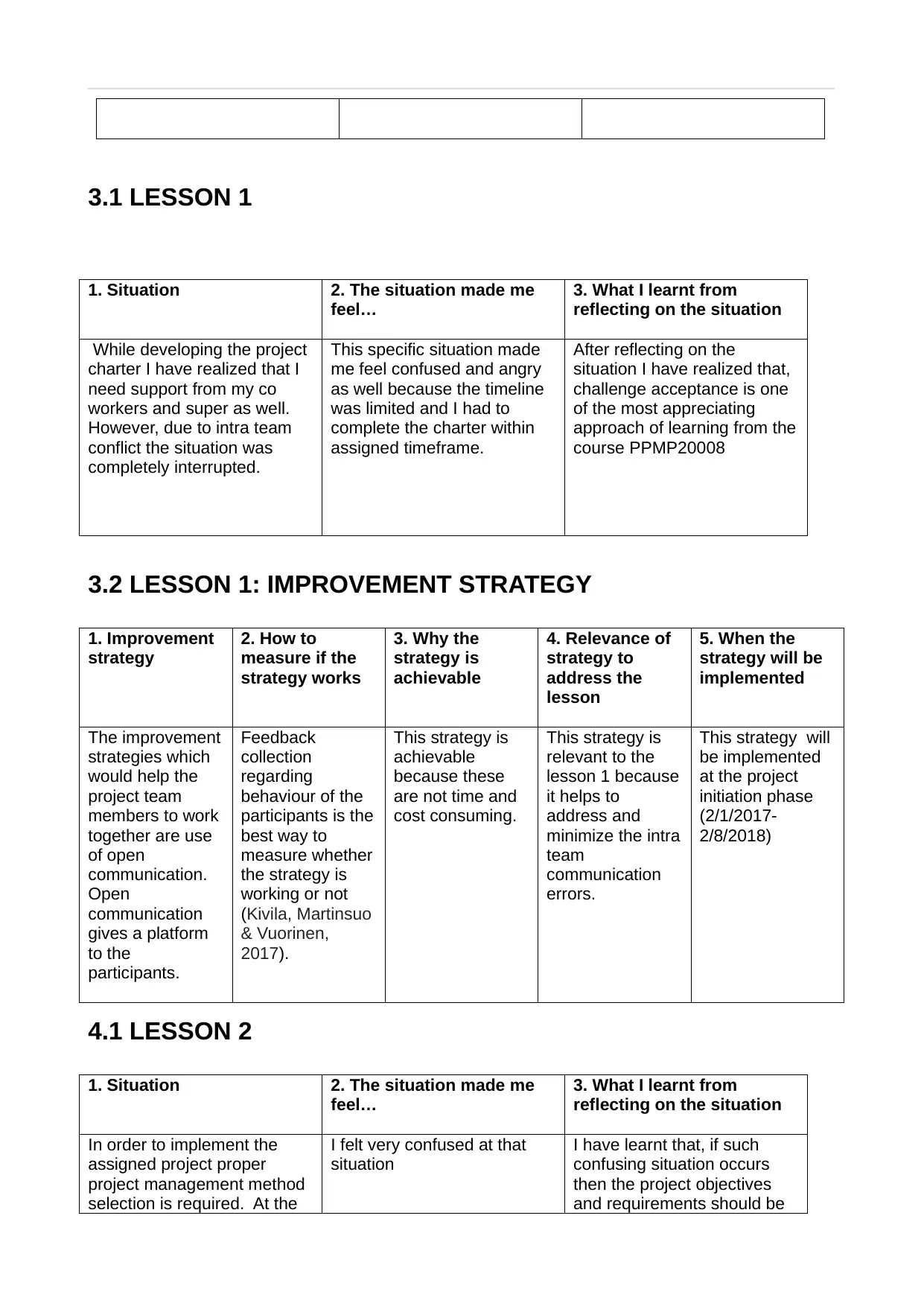
3.1 LESSON 1
1. Situation 2. The situation made me
feel…
3. What I learnt from
reflecting on the situation
While developing the project
charter I have realized that I
need support from my co
workers and super as well.
However, due to intra team
conflict the situation was
completely interrupted.
This specific situation made
me feel confused and angry
as well because the timeline
was limited and I had to
complete the charter within
assigned timeframe.
After reflecting on the
situation I have realized that,
challenge acceptance is one
of the most appreciating
approach of learning from the
course PPMP20008
3.2 LESSON 1: IMPROVEMENT STRATEGY
1. Improvement
strategy
2. How to
measure if the
strategy works
3. Why the
strategy is
achievable
4. Relevance of
strategy to
address the
lesson
5. When the
strategy will be
implemented
The improvement
strategies which
would help the
project team
members to work
together are use
of open
communication.
Open
communication
gives a platform
to the
participants.
Feedback
collection
regarding
behaviour of the
participants is the
best way to
measure whether
the strategy is
working or not
(Kivila, Martinsuo
& Vuorinen,
2017).
This strategy is
achievable
because these
are not time and
cost consuming.
This strategy is
relevant to the
lesson 1 because
it helps to
address and
minimize the intra
team
communication
errors.
This strategy will
be implemented
at the project
initiation phase
(2/1/2017-
2/8/2018)
4.1 LESSON 2
1. Situation 2. The situation made me
feel…
3. What I learnt from
reflecting on the situation
In order to implement the
assigned project proper
project management method
selection is required. At the
I felt very confused at that
situation
I have learnt that, if such
confusing situation occurs
then the project objectives
and requirements should be
1. Situation 2. The situation made me
feel…
3. What I learnt from
reflecting on the situation
While developing the project
charter I have realized that I
need support from my co
workers and super as well.
However, due to intra team
conflict the situation was
completely interrupted.
This specific situation made
me feel confused and angry
as well because the timeline
was limited and I had to
complete the charter within
assigned timeframe.
After reflecting on the
situation I have realized that,
challenge acceptance is one
of the most appreciating
approach of learning from the
course PPMP20008
3.2 LESSON 1: IMPROVEMENT STRATEGY
1. Improvement
strategy
2. How to
measure if the
strategy works
3. Why the
strategy is
achievable
4. Relevance of
strategy to
address the
lesson
5. When the
strategy will be
implemented
The improvement
strategies which
would help the
project team
members to work
together are use
of open
communication.
Open
communication
gives a platform
to the
participants.
Feedback
collection
regarding
behaviour of the
participants is the
best way to
measure whether
the strategy is
working or not
(Kivila, Martinsuo
& Vuorinen,
2017).
This strategy is
achievable
because these
are not time and
cost consuming.
This strategy is
relevant to the
lesson 1 because
it helps to
address and
minimize the intra
team
communication
errors.
This strategy will
be implemented
at the project
initiation phase
(2/1/2017-
2/8/2018)
4.1 LESSON 2
1. Situation 2. The situation made me
feel…
3. What I learnt from
reflecting on the situation
In order to implement the
assigned project proper
project management method
selection is required. At the
I felt very confused at that
situation
I have learnt that, if such
confusing situation occurs
then the project objectives
and requirements should be
Secure Best Marks with AI Grader
Need help grading? Try our AI Grader for instant feedback on your assignments.
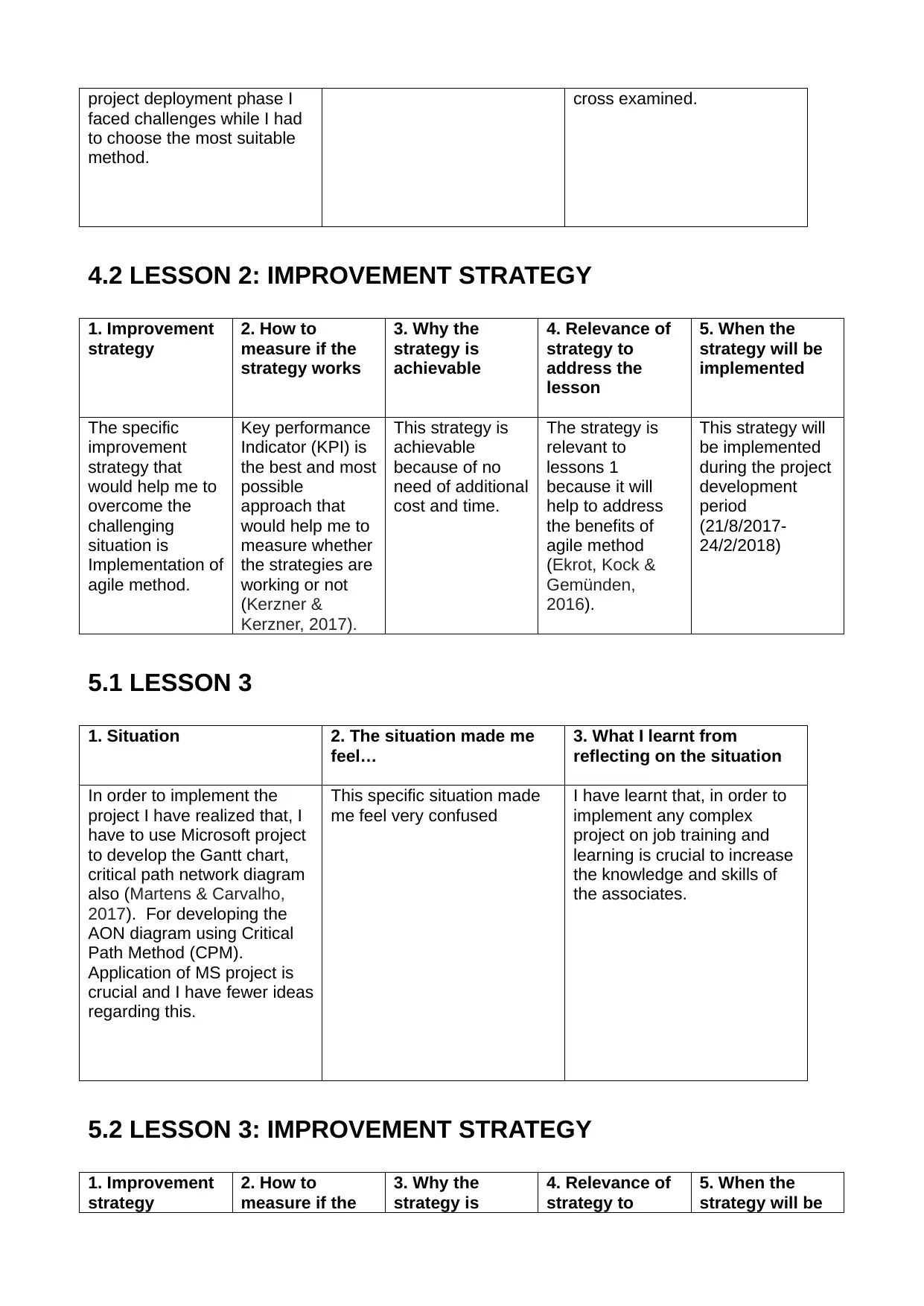
project deployment phase I
faced challenges while I had
to choose the most suitable
method.
cross examined.
4.2 LESSON 2: IMPROVEMENT STRATEGY
1. Improvement
strategy
2. How to
measure if the
strategy works
3. Why the
strategy is
achievable
4. Relevance of
strategy to
address the
lesson
5. When the
strategy will be
implemented
The specific
improvement
strategy that
would help me to
overcome the
challenging
situation is
Implementation of
agile method.
Key performance
Indicator (KPI) is
the best and most
possible
approach that
would help me to
measure whether
the strategies are
working or not
(Kerzner &
Kerzner, 2017).
This strategy is
achievable
because of no
need of additional
cost and time.
The strategy is
relevant to
lessons 1
because it will
help to address
the benefits of
agile method
(Ekrot, Kock &
Gemünden,
2016).
This strategy will
be implemented
during the project
development
period
(21/8/2017-
24/2/2018)
5.1 LESSON 3
1. Situation 2. The situation made me
feel…
3. What I learnt from
reflecting on the situation
In order to implement the
project I have realized that, I
have to use Microsoft project
to develop the Gantt chart,
critical path network diagram
also (Martens & Carvalho,
2017). For developing the
AON diagram using Critical
Path Method (CPM).
Application of MS project is
crucial and I have fewer ideas
regarding this.
This specific situation made
me feel very confused
I have learnt that, in order to
implement any complex
project on job training and
learning is crucial to increase
the knowledge and skills of
the associates.
5.2 LESSON 3: IMPROVEMENT STRATEGY
1. Improvement
strategy
2. How to
measure if the
3. Why the
strategy is
4. Relevance of
strategy to
5. When the
strategy will be
faced challenges while I had
to choose the most suitable
method.
cross examined.
4.2 LESSON 2: IMPROVEMENT STRATEGY
1. Improvement
strategy
2. How to
measure if the
strategy works
3. Why the
strategy is
achievable
4. Relevance of
strategy to
address the
lesson
5. When the
strategy will be
implemented
The specific
improvement
strategy that
would help me to
overcome the
challenging
situation is
Implementation of
agile method.
Key performance
Indicator (KPI) is
the best and most
possible
approach that
would help me to
measure whether
the strategies are
working or not
(Kerzner &
Kerzner, 2017).
This strategy is
achievable
because of no
need of additional
cost and time.
The strategy is
relevant to
lessons 1
because it will
help to address
the benefits of
agile method
(Ekrot, Kock &
Gemünden,
2016).
This strategy will
be implemented
during the project
development
period
(21/8/2017-
24/2/2018)
5.1 LESSON 3
1. Situation 2. The situation made me
feel…
3. What I learnt from
reflecting on the situation
In order to implement the
project I have realized that, I
have to use Microsoft project
to develop the Gantt chart,
critical path network diagram
also (Martens & Carvalho,
2017). For developing the
AON diagram using Critical
Path Method (CPM).
Application of MS project is
crucial and I have fewer ideas
regarding this.
This specific situation made
me feel very confused
I have learnt that, in order to
implement any complex
project on job training and
learning is crucial to increase
the knowledge and skills of
the associates.
5.2 LESSON 3: IMPROVEMENT STRATEGY
1. Improvement
strategy
2. How to
measure if the
3. Why the
strategy is
4. Relevance of
strategy to
5. When the
strategy will be
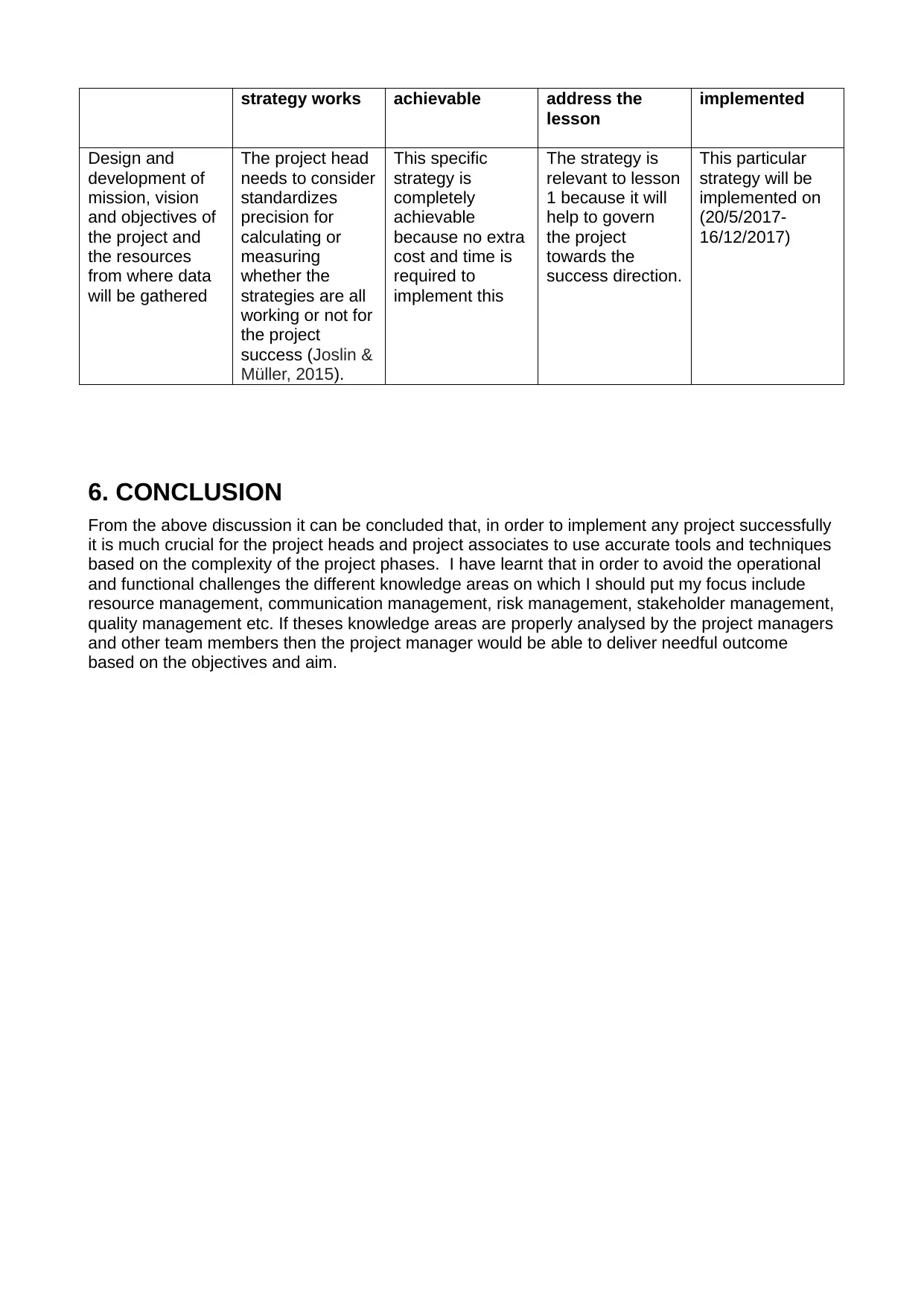
strategy works achievable address the
lesson
implemented
Design and
development of
mission, vision
and objectives of
the project and
the resources
from where data
will be gathered
The project head
needs to consider
standardizes
precision for
calculating or
measuring
whether the
strategies are all
working or not for
the project
success (Joslin &
Müller, 2015).
This specific
strategy is
completely
achievable
because no extra
cost and time is
required to
implement this
The strategy is
relevant to lesson
1 because it will
help to govern
the project
towards the
success direction.
This particular
strategy will be
implemented on
(20/5/2017-
16/12/2017)
6. CONCLUSION
From the above discussion it can be concluded that, in order to implement any project successfully
it is much crucial for the project heads and project associates to use accurate tools and techniques
based on the complexity of the project phases. I have learnt that in order to avoid the operational
and functional challenges the different knowledge areas on which I should put my focus include
resource management, communication management, risk management, stakeholder management,
quality management etc. If theses knowledge areas are properly analysed by the project managers
and other team members then the project manager would be able to deliver needful outcome
based on the objectives and aim.
lesson
implemented
Design and
development of
mission, vision
and objectives of
the project and
the resources
from where data
will be gathered
The project head
needs to consider
standardizes
precision for
calculating or
measuring
whether the
strategies are all
working or not for
the project
success (Joslin &
Müller, 2015).
This specific
strategy is
completely
achievable
because no extra
cost and time is
required to
implement this
The strategy is
relevant to lesson
1 because it will
help to govern
the project
towards the
success direction.
This particular
strategy will be
implemented on
(20/5/2017-
16/12/2017)
6. CONCLUSION
From the above discussion it can be concluded that, in order to implement any project successfully
it is much crucial for the project heads and project associates to use accurate tools and techniques
based on the complexity of the project phases. I have learnt that in order to avoid the operational
and functional challenges the different knowledge areas on which I should put my focus include
resource management, communication management, risk management, stakeholder management,
quality management etc. If theses knowledge areas are properly analysed by the project managers
and other team members then the project manager would be able to deliver needful outcome
based on the objectives and aim.
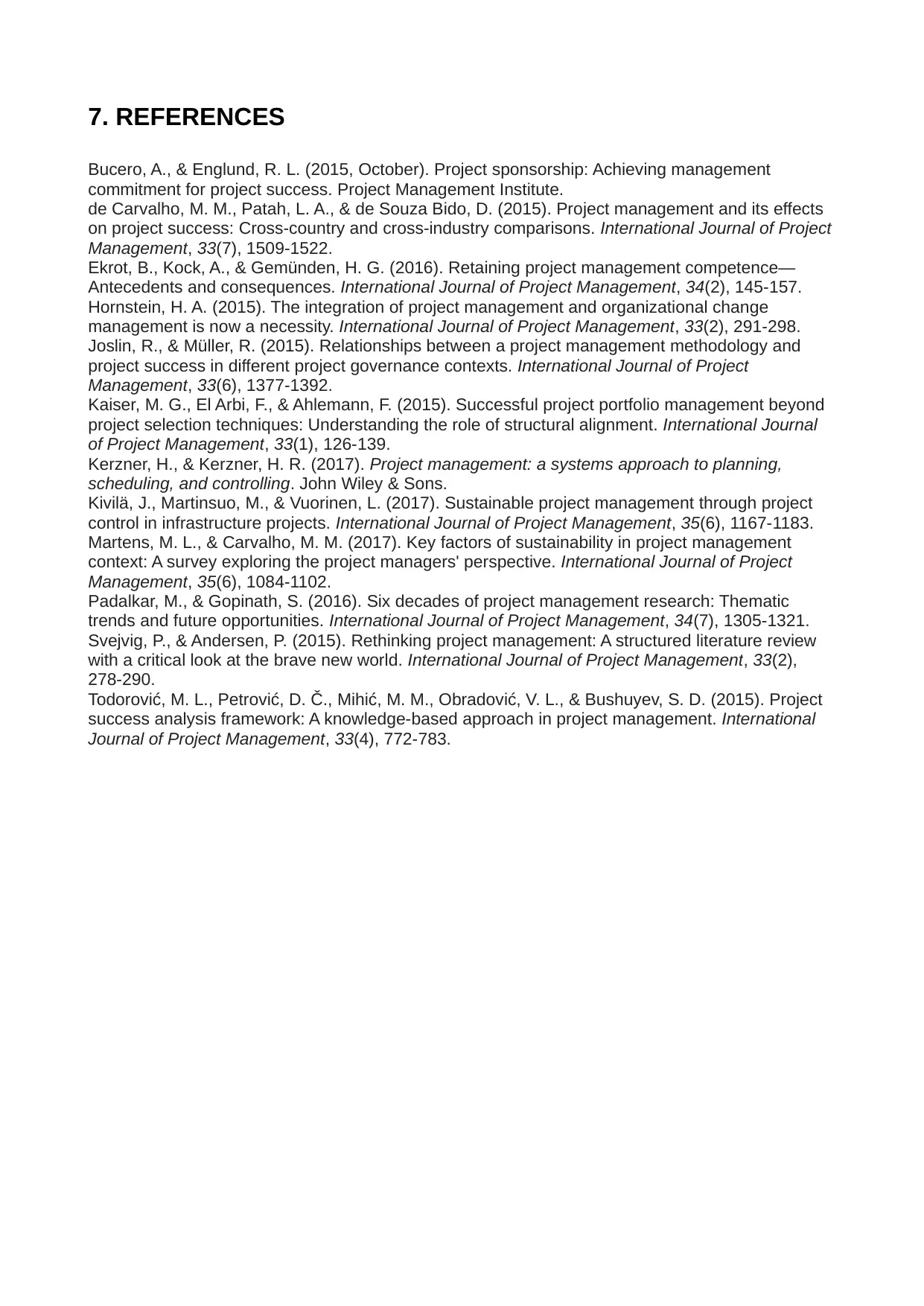
7. REFERENCES
Bucero, A., & Englund, R. L. (2015, October). Project sponsorship: Achieving management
commitment for project success. Project Management Institute.
de Carvalho, M. M., Patah, L. A., & de Souza Bido, D. (2015). Project management and its effects
on project success: Cross-country and cross-industry comparisons. International Journal of Project
Management, 33(7), 1509-1522.
Ekrot, B., Kock, A., & Gemünden, H. G. (2016). Retaining project management competence—
Antecedents and consequences. International Journal of Project Management, 34(2), 145-157.
Hornstein, H. A. (2015). The integration of project management and organizational change
management is now a necessity. International Journal of Project Management, 33(2), 291-298.
Joslin, R., & Müller, R. (2015). Relationships between a project management methodology and
project success in different project governance contexts. International Journal of Project
Management, 33(6), 1377-1392.
Kaiser, M. G., El Arbi, F., & Ahlemann, F. (2015). Successful project portfolio management beyond
project selection techniques: Understanding the role of structural alignment. International Journal
of Project Management, 33(1), 126-139.
Kerzner, H., & Kerzner, H. R. (2017). Project management: a systems approach to planning,
scheduling, and controlling. John Wiley & Sons.
Kivilä, J., Martinsuo, M., & Vuorinen, L. (2017). Sustainable project management through project
control in infrastructure projects. International Journal of Project Management, 35(6), 1167-1183.
Martens, M. L., & Carvalho, M. M. (2017). Key factors of sustainability in project management
context: A survey exploring the project managers' perspective. International Journal of Project
Management, 35(6), 1084-1102.
Padalkar, M., & Gopinath, S. (2016). Six decades of project management research: Thematic
trends and future opportunities. International Journal of Project Management, 34(7), 1305-1321.
Svejvig, P., & Andersen, P. (2015). Rethinking project management: A structured literature review
with a critical look at the brave new world. International Journal of Project Management, 33(2),
278-290.
Todorović, M. L., Petrović, D. Č., Mihić, M. M., Obradović, V. L., & Bushuyev, S. D. (2015). Project
success analysis framework: A knowledge-based approach in project management. International
Journal of Project Management, 33(4), 772-783.
Bucero, A., & Englund, R. L. (2015, October). Project sponsorship: Achieving management
commitment for project success. Project Management Institute.
de Carvalho, M. M., Patah, L. A., & de Souza Bido, D. (2015). Project management and its effects
on project success: Cross-country and cross-industry comparisons. International Journal of Project
Management, 33(7), 1509-1522.
Ekrot, B., Kock, A., & Gemünden, H. G. (2016). Retaining project management competence—
Antecedents and consequences. International Journal of Project Management, 34(2), 145-157.
Hornstein, H. A. (2015). The integration of project management and organizational change
management is now a necessity. International Journal of Project Management, 33(2), 291-298.
Joslin, R., & Müller, R. (2015). Relationships between a project management methodology and
project success in different project governance contexts. International Journal of Project
Management, 33(6), 1377-1392.
Kaiser, M. G., El Arbi, F., & Ahlemann, F. (2015). Successful project portfolio management beyond
project selection techniques: Understanding the role of structural alignment. International Journal
of Project Management, 33(1), 126-139.
Kerzner, H., & Kerzner, H. R. (2017). Project management: a systems approach to planning,
scheduling, and controlling. John Wiley & Sons.
Kivilä, J., Martinsuo, M., & Vuorinen, L. (2017). Sustainable project management through project
control in infrastructure projects. International Journal of Project Management, 35(6), 1167-1183.
Martens, M. L., & Carvalho, M. M. (2017). Key factors of sustainability in project management
context: A survey exploring the project managers' perspective. International Journal of Project
Management, 35(6), 1084-1102.
Padalkar, M., & Gopinath, S. (2016). Six decades of project management research: Thematic
trends and future opportunities. International Journal of Project Management, 34(7), 1305-1321.
Svejvig, P., & Andersen, P. (2015). Rethinking project management: A structured literature review
with a critical look at the brave new world. International Journal of Project Management, 33(2),
278-290.
Todorović, M. L., Petrović, D. Č., Mihić, M. M., Obradović, V. L., & Bushuyev, S. D. (2015). Project
success analysis framework: A knowledge-based approach in project management. International
Journal of Project Management, 33(4), 772-783.
1 out of 7
Related Documents
Your All-in-One AI-Powered Toolkit for Academic Success.
+13062052269
info@desklib.com
Available 24*7 on WhatsApp / Email
![[object Object]](/_next/static/media/star-bottom.7253800d.svg)
Unlock your academic potential
© 2024 | Zucol Services PVT LTD | All rights reserved.




